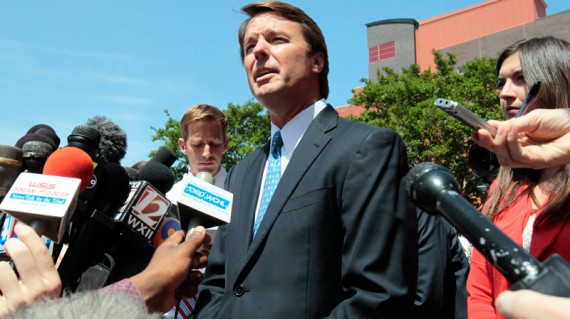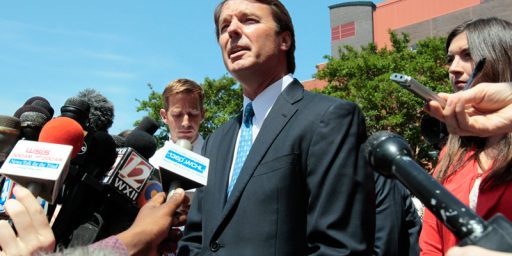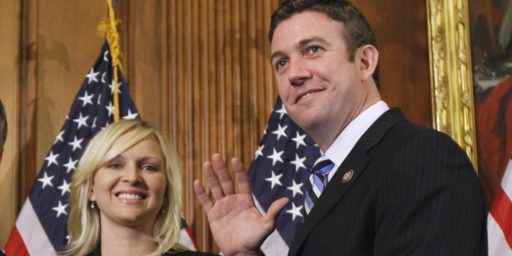U.S. v. John Edwards: Both Sides Are Rolling The Dice
Both sides in the John Edwards case are heading into uncharted territory.
The final offer from the United States Attorney was, under the circumstances, rather generous:
Former presidential candidate John Edwards turned down a deal last week that would have had him pleading guilty to misdemeanor charges – and avoiding the felony campaign finance charges he faces – because it also would have put him behind bars for six months, according to a report.
Edwards and his lawyers were considering accepting the deal, the Raleigh News and Observer reported Sunday, but wanted the ability to argue for an arrangement that would allow him to spend time with Emma Claire and Jack, his two younger children with Elizabeth Edwards, who died in December. Under the deal, he would have pled guilty to three misdemeanor campaign law finance violations.
Edwards’s lawyers thought they wouldn’t be able to argue for him to go to a halfway house, be on house arrest or have weekend releases, sources told the paper, and without that assurance, they walked away from a deal. Prosecutors wanted him to serve six months in jail as part of the deal, the paper said
The most important thing about this plea offer is that misdeameanor convictions would have allowed Edwards to retain his law license, a felony conviction (or the original DOJ plea offer that called for a guilty plea to one felony) would have meant that Edwards would have likely automatically have lost his license. Six months in what would most likely have been a minimum security Federal Prison seems a small price to pay to avoid the risk of multiple felony convictions, not to mention the expense of a Federal criminal defense and the embarrassment likely to ensue from having the entire Rielle Hunter story retold before a courtroom of people.
Essentially, Edwards and his attorneys seem to be gambling on the idea that this criminal case is going to be tough to prove:
Federal prosecutors regularly secure guilty pleas in campaign finance-related cases, but the Justice Department’s record in cases that go before a jury is mixed — at best. Edwards is the highest profile in a series of high-stakes prosecutions that include the acquittal of a senior aide to Hillary Clinton in 2005 and the 2008 acquittal of a donor to Edwards’s own 2004 campaign.
And campaign finance lawyers said that while jurors may judge Edwards harshly, both judge and jury could be difficult to convince that he broke the law.
“Here I am a conservative Republican, I’m no fan of John Edwards — but I really think this indictment is a stretch under the federal elections laws,” said Michael Toner, a former Federal Election Commission chairman. “Any time the government is relying on an obscure 11-year old FEC advisory opinion to support a criminal prosecution, it’s uphill.”
(…)The core of Edwards’ argument – that he was trying to hide an affair from his dying wife, not the government – will hardly make him a sympathetic character.
Still, prosecutors head into a possible trial with history suggesting they’ll have their work cut out for them in front of a jury.
“The idea of going to trial on a pure campaign finance count is unusual because those types of cases — 99 times out of 100 — get resolved through plea agreements,” said Jan Baran, a Republican campaign finance lawyer. “I’m under the impression [prosecutors] win more often than lose, but not by as wide a margin as in corruption cases generally.”
“It’s a lot easier to get a conviction when there’s an odor of a quid pro quo for illegal contributions…or if there’s a whiff of defrauding the government,” Baran added. “Where there’s not something like that, I think it’s a little harder for the government to explain what the inherent evil is.”
Basically, the indictment alleges that Edwards, working in concert with his close associate Andrew Young, along with former campaign finance chairman Fred Baron and Rachel “Bunny” Mellon, the widow of banking heir Paul Mellon, raised money amounting to $ 925,000 to keep Hunter hidden. Prosecutors argue that this money was meant to aid his campaign by preventing the affair, and the love child, from becoming public. The prosecution could have problems here, however, in that Baron died in 2008, Mellon is 100 years old, and there manner in which the payments was made seems to makes it hard to sustain an argument that they were mean to benefit the campaign rather than Edwards personally:
The money came from two Edwards supporters — his national campaign finance chairman, Fred Baron, who died in 2008, and banking heiress Rachel “Bunny” Mellon, who is 100.
In an interview last year, Young said Baron provided hundreds of thousands of dollars and loaned his Aspen, Colo., estate to the Youngs and Hunter. Mellon provided about $700,000. Young said he and Edwards called her contributions “Bunny money.”
According to Mellon’s attorney, she gave the money to Edwards as a personal gift and filed a gift tax return.
“She intended it for his personal use and had no understanding of what his need was and where the money would go,” her attorney, Alexander Forger, told the Associated Press in January 2010.
But prosecutors likely think the money constituted campaign contributions because it was used to preserve Edwards’ political viability.
The filing of a gift tax return (Baron also filed such a return for his payments, which actually went directly to Hunter) argues strongly that the payments were intended as personal gifts, not payments to the campaign. Nonetheless, the prosecution is apparently arguing that because revelation of the affair likely would have harmed his campaign, anything that was spent in furtherance of the scheme to keep the affair and pregnancy secret are a contribution to the campaign. This seems to me to be a pretty far stretch of the law, and the fact that it is based on an 11 year-old legal opinion that’s never been tested in court before makes this entire prosecution risky. More importantly, though, I have to agree with John Hinderaker that there’s something about this case that makes me uncomfortable:
I am no fan of John Edwards, but this prosecution strikes me as unfortunate. Based on a quick review, it does not seem to be an indefensible application of the campaign finance laws, although the government’s theory, as Edwards’ lawyer put it, is “novel and untested.” But what’s the point? The campaign finance laws are intended to keep candidates on a level playing field. (Some would say they are mainly intended to promote the re-election of incumbents, but that is a debate for another day.) The money that was spent here didn’t go for campaign ads or get-out-the-vote efforts. It was invisible to voters. It allowed Edwards to keep his wife (and voters too, of course) in the dark about his girlfriend and baby and relieved Edwards of the need to support them. Those are hardly noble objectives, but is policing this sort of misconduct really the function of campaign finance laws?
The prosecutors tried to gild their dubious lily by including in the indictment the allegation that Edwards “made false statements” “on national television.” This was alleged to be one of the “overt acts” in furtherance of Edwards’ criminal conspiracy. But lying to reporters isn’t a crime; if it were, we would have a hard time staffing Congress. (Anthony Weiner is just the latest in a long line of politicians who illustrate the point.)
This prosecution strikes me as another step in the Criminalization of Nearly Everything. Edwards is disgraced and deserves to be. But if he didn’t otherwise commit a crime in trying to get away with hiding his mistress and child–a desperate gamble, at best–the fact that some of his friends tried to help him shouldn’t turn his sleazy behavior into a felony.
The risk for Edwards, of course, is that jurors will be unable to look beyond his admittedly sleazy behavior, which is why his best hope may be to get this tossed out by a judge before it ever gets sent to a jury. If that happens, all bets are off and, even if it ultimately gets overturned on appeal, I wouldn’t be surprised to see John Edwards get convicted.






I think Edwards is a slimebag and an embarrassment to the Democrats. But still I’m betting he gets off.
Like Clinton’s b’j I think this is a waste of time and resources.
It’s not like Larry Craig who spent a lot of time and effort trying to deny others of a lifestyle he was privately taking part in. Or David Vitter pretending to be an apostle of family values while paying a hooker. Or Newt schtumping while impeaching.
I could be wrong but I don’t recall family values and a holier than thou morality being part of Edwards schtick.
Doug, how come the stories about Palin and others, yet Anthony (big) Weiner gets a pass from you? Not enough of a story there or is it because you hate Palins and adore Weiners?